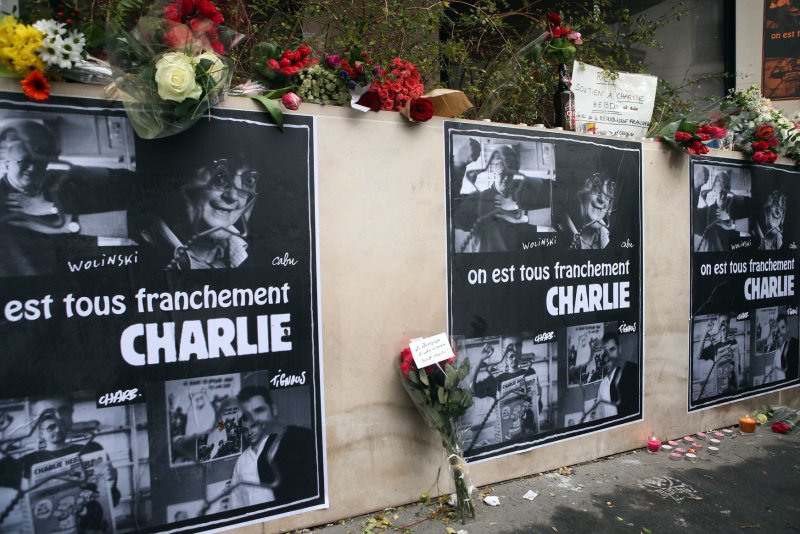Flowers and candles brought by well-wishers adorn a street corner near Charlie Hebdo weekly's office building, on January 8, 2015. In France's deadliest postwar terrorist attack, 2 policemen and 10 journalists died after terrorists stormed and open fired during an editorial conference. Photo by Maya Vidon-White/UPI |
License Photo
As France grieves over the cold-blooded murders of twelve of its journalists in Paris (and the subsequent grocery store shoot out), the larger question is what consequences, if any, will arise from these outrages. Aside from widespread vigils and demonstrations against these atrocities, little real action may follow. Recent events suggest why rhetoric often dominates response.
Just over two years ago, twenty children were mown down in the otherwise peaceful town of Sandy Hook, Connecticut. That despicable act triggered massive protests across America calling for gun control and greater restrictions on firearms. Euphemistically called "gun safety," after many other school and mall shootings, the time for action to control gun violence finally seemed to have come.
How wrong that prediction was. The National Rifle Association (NRA) massed its resources and political punch to cut off efforts at reform. Sadly, the Sandy Hook tragedy ironically ended the chances for meaningful gun control because of the NRA's influence. Too many members of Congress, especially in the House, were dependent on NRA members' votes to display enough backbone to take on gun violence.
The attack on Charlie Hebdo has rightly provoked broad condemnation. The question is what if anything will be done to curtail these acts of violent extremism. Sandy Hook and other shootings had negative impact on limiting these horrific acts in America. Will the same outcome occur in the form of a backlash by radical fundamentalists exploiting this latest instance of terror?
Exacerbating these tragedies in Paris is the fundamental challenge of terror and its threat to limiting free speech particularly when dealing with Islam. While the Koran does not mandate the death penalty for insulting the Prophet, words can be tortured to mean virtually anything. Among the Ten Commandments is the stricture not to use the Lord's name in vain. Could death be implied as a warning for breaking that commandment? And in adapting Sharia law from the Koran, obviously present is the intent to impose ideological and political aims that use religion as a weapon.
Sharia law is not universal. For example, Sharia Law in Indonesia is universes away from Sharia Law as practiced by the Islamic State and the Taliban. In Saudi Arabia, Sharia Law allows execution by beheading and other harsh punishments such as the lash.
In Pakistan, the governor of Punjab, Salmaan Taseer, was assassinated because of his opposition to the blasphemy laws that were punishable by death. Worse, many Pakistanis regarded his assassin as a hero, something most Westerners could never understand or accept. And in some Arab and Muslim countries, stoning to death for adultery and amputation of limbs for theft are authorized punishments.
Perhaps parallels between the two brothers who bombed the Boston marathon two years ago and the two siblings in Paris can be drawn. However, a more frightening alarm must be sounded. Perversion of religion for ideological and political reasons will inevitably lead to greater violence and terror. And future attacks may not be limited to one or two individuals acting independently.
Muslims number about 1.4 billion. If one tenth of one percent can be or are radicalized, that cohort of about 1.4 million is larger than the U.S. military. Polls conducted by Gallup and the University of Maryland suggest -- and the size could be much greater -- that perhaps 10% of all Muslims support or tolerate the use of violence in the name of the Prophet. That is about 140 million individuals. Toleration does not mean actually using violence and terror. But, as in Pakistan, a significant portion of the public sees little wrong with defending acts against Islam with murder and death.
One vitally needed response is employing a counter-narrative to delegitimize and counteract this grotesque manipulation of a great religion. That such a response has not been undertaken yet is an extraordinary failure on the part of civilized peoples. This fault especially applies to political and spiritual leaders of Islam.
Unless or until these blasphemies against Islam perpetrated by those who use violence and terror in the name of Allah are rejected both within and outside Islam, this perversion will not end. And as long as IS and other radical groups are allowed their own versions of Sharia Law, these threats will not dissipate of their own weight.
It took the murder of one Archduke to precipitate World War I. What will it take to generate action against these enemies of Islam? So far the record and answers are not promising.
___________________________________________________________________
Harlan Ullman is Chairman of the Killowen Group that advises leaders of government and business and Senior Advisor at Washington D.C.'s Atlantic Council and Business Executives for National Security. His latest book is A Handful of Bullets: How the Murder of Archduke Franz Ferdinand Still Menaces The Peace.















